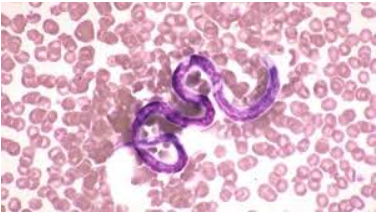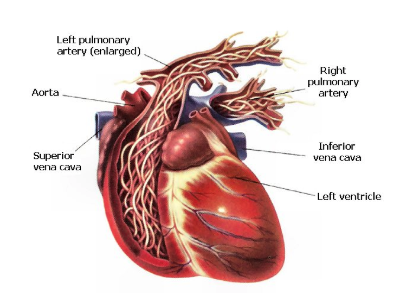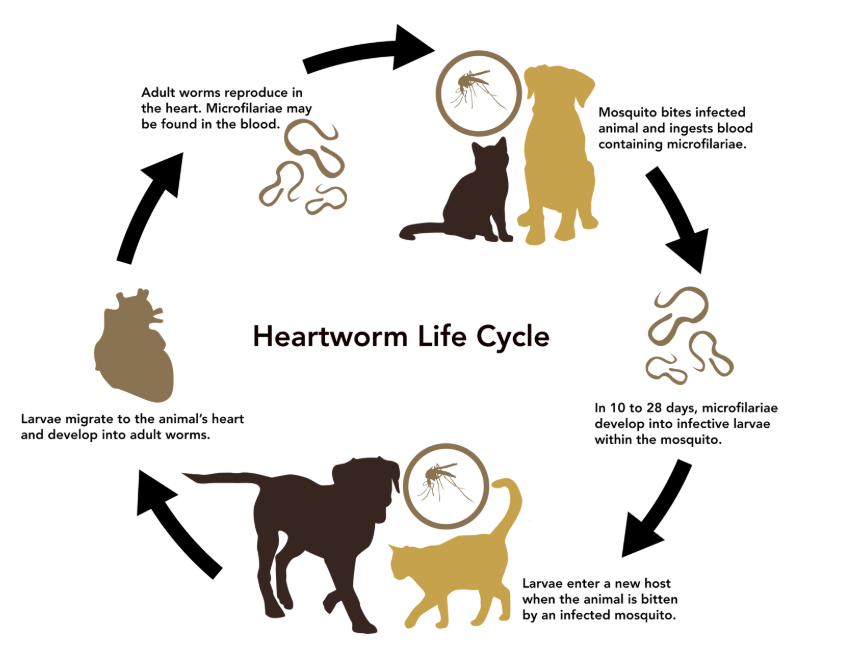In recent years, people have been rescuing more and more dogs from overseas, or countries south of us. A lot of the dogs are displaced from their homes during natural disasters like Hurricane Katrina, or the flooding in Texas. Some dogs are rescued from overrun shelters, or off of the streets in countries overseas. Good Samaritans open their homes and hearts to dogs in need, but unfortunately, by doing so, we are also welcoming in unwanted parasites. In many cases, these dogs are introducing parasites like heartworm into Canada.

Heartworm is a blood parasite that is transmitted by mosquitoes. The larvae, also called microfilaria, start out by swimming in the bloodstream of the infected dog or cat. As they mature into adult worms, they reside inside the pulmonary arteries instead of actually inside the chambers of the heart. When the infections become heavy enough, the worms will back up into the right atrium and ventricle of the heart. A canine heart can hold anywhere from 25 to 100 worms, but when the parasite load reaches around 100 worms, serious complications can occur. The more worms that are in the heart, the less room there is for blood to flow to the lungs and become oxygenated. A feline heart can hold only 1-3 worms, though even one can cause extreme health issues or even death.

Symptoms of an animal that has a heartworm infection can include coughing, shortness of breath, exercise intolerance, accumulation of fluid in the chest or abdomen, nose bleeds and in some cases, sudden death. Caval Syndrome commonly causes sudden death, due to heartworm. This is when the worm load is so heavy, that they start to back up from the pulmonary arteries, into the right atrium and ventricle and then into the other veins that feed blood into the heart. Because there are so many worms, blood has a hard time reaching the lungs, where it needs to be oxygenated. If blood cannot be oxygenated then the brain, organs and other tissues cannot function, resulting in collapse, shock, and red blood cell destruction. This will usually cause death in 1-2 days unless drastic treatment measures are attempted.

Please don’t let the takeaway message from this blog be that I think we shouldn’t rescue dogs in need. I’ve owned a sweet rescue Chihuahua from Georgia, who was going to be put to sleep if another shelter didn’t step in to save her. Rescue dogs and the people who rescue them have a special place in my heart. My main message is that when we rescue dogs, we should work on having better parasite testing and treatment plans to help protect other dogs that are already living in Canada. For dogs to cross the border into Canada, all they need to have is a rabies vaccine. Which is great, but we could be doing so much better! Canada should initiate more thorough standards to protect us and our pets. I would like to see more requirements for deworming, plus testing for other transmissible diseases and infections such as these tick and mosquito-borne diseases before animals enter Canada.
When we at Hillcrest Animal Hospital are providing annual health exams and vaccines for our canine patients, we are also recommending a test that we refer to as a 4dx test. This test is screening for the presence of Lyme disease, Heartworm, Anaplasma phagocytophilum, Anaplasma platys, Ehrlichia canis and Ehrlichia ewingii. If any of our patients that are native to Ontario come up positive, it is most commonly for Lyme disease. The dogs that have come from outside of Canada that have a 4dx test done, are more commonly positive for Anaplasma or Ehrlichia (one case was even positive for both), or heartworm. Heartworm is not a disease that we see a lot of here in Ontario, but as more untested, heartworm positive dogs enter Canada, the more we are going to start seeing it spread to our native dogs.
If you are thinking of bringing in a rescue dog and their medical history is unknown, or they are coming from an area that is known for heartworm, it is important to work with the rescue organization or your veterinarian to have proper testing and treatment performed. Remember, we aren’t just rescuing dogs, we are rescuing possible parasites who would also love to make Canada their new home. There is a simple screening test called a 4dx test, as mentioned above, that helps to detect heartworm. If your pet is positive, make sure you speak with your veterinarian about the best plan of treatment and prevention.
By making sure we have our pets tested annually and on proper prevention, we can ensure our beloved pet is protected from fleas, intestinal parasites, ticks, heartworm, additional parasites and diseases that ticks and mosquitoes spread. If you have any questions about the different types of prevention and what would be best for your pet, please don’t hesitate to contact us, we are happy to help you!
Written by Kelsey Hewgill, RVT




